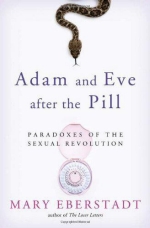By Mary Eberstadt
Ignatius Press 2012
Mary Eberstadt is a research fellow at the Hoover Institution and consulting editor to Policy Review. What is clear after reading her short but intense book is that she is above all a perceptive observer of reality. The title of her book is eloquent and thought-provoking.
It is no secret to any of us that the sexual revolution has brought about considerable anthropological consequences. As the name indicates, it has revolutionised the way humans are living a very fundamental dimension of their lives, one that affects people’s intimacy and relationships. Many of our contemporaries see this revolution to be a given fact from which there is no return. They do not even give heed to growing scientific evidence – in the areas of public health, psychology and sociology – of the damage this revolution has had on people’s lives and on society.
In this book, on the other hand, Mary Eberstadt deals with much of this scientific evidence. She guides the reader step by step to take an unprejudiced look at the consequences of the sexual revolution on the lives of women, men, children and young people. She concludes the book with two interesting chapters that ask: “Is food the new sex?” and “Is pornography the new tobacco?” She tells us about some of the latest trends in the Western World that demonstrate in a paradoxical way that there is an enormous moral gap in our culture. An example of this gap is the holding of a moral code on what should or should not be eaten (organic food, fairtrade food), yet people claim that sexuality is exempt from any universal moral code and that people make their own decisions about it.
It is also an important fact that Adam and Eve after the Pill joins a wide list of books that discuss the subject of the extent to which Pope Paul VI’s encyclical Humanae Vitae, a very controversial document at the time, is to be considered instead a prophetic document. It was published in 1968 when the sexual revolution was at its highest point. The encyclical was not understood and badly received, and it was mostly ignored even in Catholic circles. However, several generations later and in view of the growing evidence that can be clearly seen, it is important to take courage and renew our efforts to present the teachings of the Church concerning human sexuality.
The author wanted her book to be an analysis guided most of all by common sense. She wanted to add her voice to so many others who can see how humanity is being increasingly damaged by the sexual revolution. They try to give space to the voice of reason and to true freedom. True freedom does not conform to the dictates of passing whims or passion. It is an open invitation to men and women to live out their sexuality as a gift, a call to communion that makes it possible to be able to experience love that is pure, sound and genuine.
Ana Cristina Villa B.






